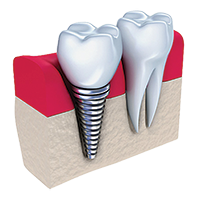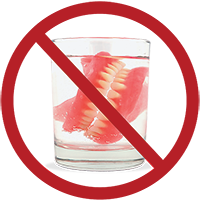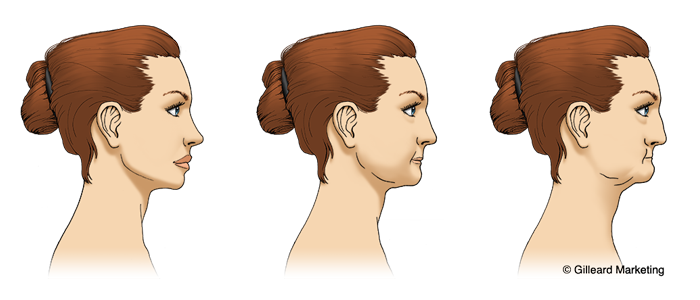Benefits of Dental Implants in Mays Landing & Linwood, NJ

Dental Implants are the modern solution for missing teeth
- Minimally Invasive Implant Procedure
- Disadvantages of Dentures
- Who are candidates for Dental Implants?
What is a dental implant?
Video: What is a dental implant?

Most dental professional prefer dental implants to replace missing teeth.
A dental implant is an artificial tooth root made of titanium. It is placed in the jawbone and a crown is placed on top via a connecting piece called an abutment.
Dental implants are also used to support dentures, to add stability and to support dental bridges, for partial and full-mouth teeth replacement.
Learn more about our Options for Missing Teeth.
The modern solution
Most dentists agree that dental implants are the modern solution for missing teeth, preferred over both dental bridges for single-tooth replacement and dentures for multiple-tooth replacement.
Dental implants:
- Look, feel and act like natural teeth. People usually don’t notice any difference.
- Are the strongest and longest-lasting replacement for missing teeth.
- Let you talk, chew and exert pressure just like with natural teeth.
- Don’t require alteration to the structure of adjacent teeth, as with dental bridges.
- Deter or prevent bone loss that occurs when teeth are lost.
- By filling the gap, they keep adjacent teeth stable and prevent bacteria from accumulating that would lead to gum disease.
Minimally invasive procedure
With modern technology dental implant surgery has become a minimally invasive procedure requiring no cutting or suturing. This means also little to no post-operative discomfort.
Learn more about our Dental Implant Procedure.
A viable alternative to Dentures
 In the past, losing teeth meant one thing: getting dentures. Dentures are still the teeth replacement option of choice for many people due to their affordability. Some people are also afraid of surgery.
In the past, losing teeth meant one thing: getting dentures. Dentures are still the teeth replacement option of choice for many people due to their affordability. Some people are also afraid of surgery.
These days there are many affordable options to replace missing teeth using dental implants and through advancements in technology, dental implant surgery has become minimally invasive.
The disadvantages of Dentures
- Dentures have only 10% or less of normal chewing power, making it difficult to eat food you want and need
- Dentures have to be kept in the mouth using adhesives
- Dentures have to be removed for cleaning
- Dentures cover the roof your palate, interfering with your sense of taste
- Dentures can click while eating
- Dentures encourage bone loss in the jaw bone
The dangers of Dentures and leaving teeth missing
#1 When a tooth is lost or extracted the bone where the tooth was starts to atrophy.
In the first year after a tooth is lost, 25% of the bone volume is reabsorbed back into the body. This process continues until potentially only the hard basal bone of the jawbone is left.
Dentures accelerate this bone loss process by aggravating the boney ridges where teeth sit, wearing them down.
This loss of bone in the jawbone eventually causes collapse of the facial muscles around the jaw. The height between the tip of the nose and the chin progressively decreases, causing the lower third of the face to collapse. This collapse inwards of the face also creates excessive wrinkles around the mouth, drooping jowls, sagging skin and thinning lips. The chin becomes more pointed. A person’s appearance can be aged many years as a result.

Missing teeth and wearing dentures cause a gradual progression of bone loss until the face appears to collapse in on itself.
Implant-supported teeth replacement options such implant-supported bridges and dentures maintain high chewing pressure and preserve bone.
Learn more about the Options for Missing Teeth.
#2 Dentures provide only 10% of natural chewing power.
This means having to avoid healthy foods such as hard fruits, nuts and hard vegetables and other healthy foods, which could create a condition of malnourishment.
#3 Due to the continuous loss of bone, dentures easily lose their fit. This can cause denture sores and painful chewing.
Who are candidates for Dental Implants?
Denture wearers or people who have had missing teeth for a long time suffer from bone loss in the bony ridges that normally support the tooth roots. In the past people with insufficient bone have been refused dental implant treatment. Now, with advanced bone grafting technology, plus the ability to locate available bone through 3D imaging technology, the majority of people can receive implants regardless of the volume of bone.
People with certain health conditions such as diabetes or habits such as smoking were previously not considered candidates for implants because of the potential risk of failure of the implant or of infection. With recent developments in technology these people can now be safely treated.
To make an appointment, call 609.625.3499 (Mays Landing), 609.927.8448 (Linwood) or click here to request an appointment online.